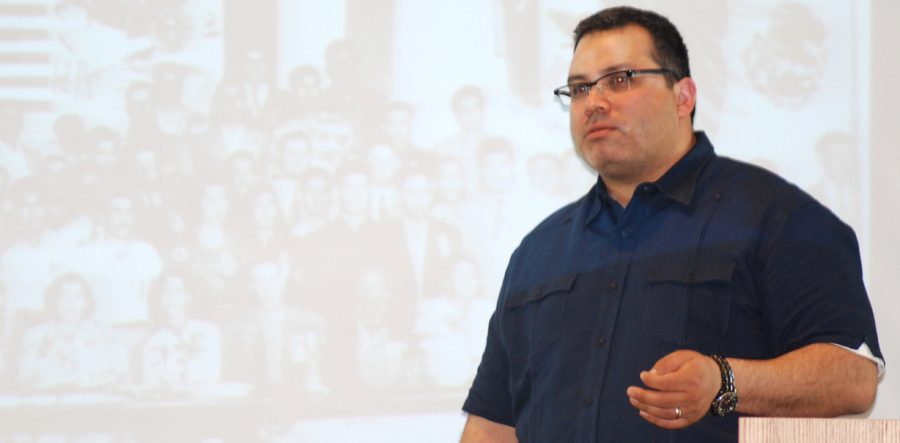April 9, 2014
By Christopher Clapper
The history behind labor organizations has been one filled with trials and tribulations, said Armando Ibarra.
Ibarra is an associate professor for the School of Workers Department of Labor Education and a faculty affiliate with the Chicano and Latino Studies program at the University of Wisconsin-Extension/Madison.
Ibarra specializes in the lives and work of Mexican farmworker families in California. He dedicated his dissertation to the research of Mexican poverty and migrant work in California.
Ibarra recently visited UW-W to talk about the recent struggles of the farm workers.
“Many of you might not know that the central valley of California produces approximately 25 percent of all food consumed in the United States,” Ibarra said. “It is a $45 billion industry that employs 12.3 million men, women and, yes, children. It also is an industry that keeps a large portion of its workforce in poverty.”
The lecture focused on iconic Latino labor leaders, such as Cesar Chavez and Dolores Huerta, but also mentioned other smaller
figures in the labor rights fight, such as Ernesto Galarza, whom Ibarra has recently published a book about.
Ibarra specifically focused on Ernesto Galarza, whom he said he believes is of equal importance to Cesar Chavez, and based on the reaction of the crowd, much less famous.
When asked if anyone had heard of Galarza, not one student raised his or her hand. This did not seem to faze Ibarra at all.
“Wonderful,” he said during his lecture. “Now I get to tell you all about him.”
Ernesto Galarza was a Mexican-American labor activist. He played a key figure in the history of immigrant work.
Although he failed, Galarza attempted to create the first multiracial farm worker union.
About 70 students and faculty attended the lecture in the University Center.
Some students were present because of class requirements but were unsure what to expect.
“I was expecting to learn something about Spanish culture,” senior Rebeca Olson said “I knew that it had to do with farming but I wasn’t really sure specifically what it was about.”
Olson attended to fulfill her Spanish professor’s homework of mandatory attendance at two lectures regarding Latino culture.
Despite going into the lecture with little knowledge of the topic, Olson said she left pleasantly surprised.
“Coming in with no expectations, I didn’t really know what I was going to learn, but throughout the presentation I was able to see a connection I had with the topic and being a human resource major,” Olson said.
Olson is currently taking a public relations class where she said she learns about the history of unions.
“The information in that class directly correlates to this presentation and helped me earn a great respect for these farm workers,” Olson said.
Ibarra knows the struggle of these workers firsthand as his grandfather was a farmworker for many years. This is one of the many reasons he was chosen by Ramon Ortiz, the interim director of Latino affairs, to give this lecture.
“The reason we chose Dr. Ibarra is because Cesar Chavez’ legacy is one that’s vested in the idea of organizing and bringing people together for collective issues that benefit broader communities,” Ortiz said. “Dr. Ibarra has a wonderful track record of being able to blend both the academic and scholarly perspective and theory of labor organizing, as well as some practical experience in organizing.”


